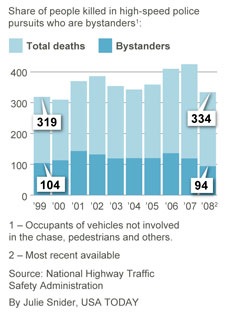 When we hear about the ill-advised nature of high-speed police pursuits, it’s usually in relation to injuries suffered by pedestrians or occupants of uninvolved vehicles. But Brian Werner, a Nebraska man who was paralyzed in such a chase, was actually a passenger in a car being pursued. He sued the state for damages and was recently awarded $1 million—the maximum allowable under Nebraska law. As the appellate court’s decision makes clear, the case boiled down to whether Werner—who was in possession of methamphetamine at the time—had any culpability at all for the driver’s rash decision to try and evade arrest:
When we hear about the ill-advised nature of high-speed police pursuits, it’s usually in relation to injuries suffered by pedestrians or occupants of uninvolved vehicles. But Brian Werner, a Nebraska man who was paralyzed in such a chase, was actually a passenger in a car being pursued. He sued the state for damages and was recently awarded $1 million—the maximum allowable under Nebraska law. As the appellate court’s decision makes clear, the case boiled down to whether Werner—who was in possession of methamphetamine at the time—had any culpability at all for the driver’s rash decision to try and evade arrest:
Werner testified that he did not encourage Korth to flee from law enforcement and that he had asked Korth to let him out of the car. Werner explained that he had “heard” that Korth had previously fled from law enforcement, that “nothing good was going to come” from being in the car, and that “it just was not going to end good.” The County objected on hearsay grounds to Werner’s testimony about having “heard” of Korth’s prior history of fleeing from law enforcement. The court overruled the objection and admitted Werner’s testimony.
The court found for Werner. It found that law enforcement had engaged in a “vehicular pursuit” of Korth’s car and that the pursuit was a proximate cause of Werner’s injuries. The court also found that under § 13-911, Werner was an “innocent third party.” We have defined an “innocent third party” as “one who has not promoted, provoked, or persuaded the driver to engage in flight from law enforcement personnel and one who is not sought to be apprehended in the fleeing vehicle.” The court found that [Officer] Wemhoff sought to apprehend the driver for suspected driving under the influence and speeding. Because the court determined that Werner was the passenger in the fleeing car—rather than the driver—the court concluded that Wemhoff had not sought to apprehend Werner. And the court determined that Werner had not “promoted, provoked or persuaded” Korth to flee. The court found that Werner was an “innocent third party.”
What I find most striking about this decision is that it seems to run counter to the way that the law determines who qualifies as an accomplice in criminal matters. So many times, unsuspecting people who have driven acquaintances to and from crime scenes have ended up at the defendant’s table—particularly in cases involving drugs. But in this civil matter, the court was clearly more forgiving of Werner’s character flaws.
At least one justice had reservations about this decision, however: In a concurring opinion, he asked the Nebraska legislature to alter its definition of “an innocent third party,” so that men like Werner would no longer be eligible for damages. Ending counterproductive police pursuits would seem like a wiser course of action, though.


Joe Posner // Dec 29, 2012 at 2:54 pm
It’s actually not counter to the general definition of being an accomplice that the court told me when I served on a Grand Jury for a year. The definition we had was that aiding and abetting required two elements: 1) agreeing with the goals of the person and 2) taking action to advance those goals.
Driving a person to a scene is taking action but being the passenger is passive.
Brendan I. Koerner // Jan 3, 2013 at 12:14 pm
@Joe Posner: Belated thanks for the clarification on this. Still an interesting case, though, especially because of the way it involves the “excited utterance” exception to the hearsay rule. Worth a read for legal geeks.